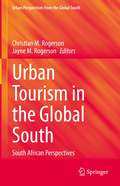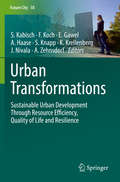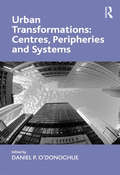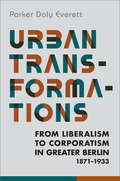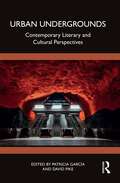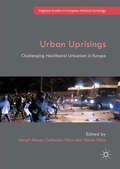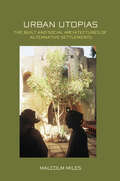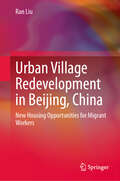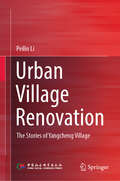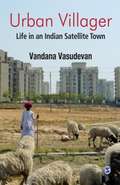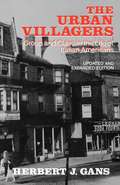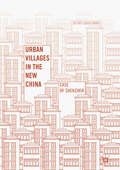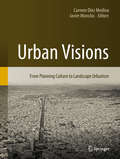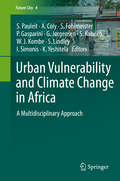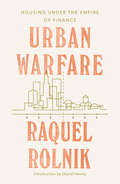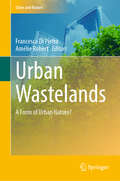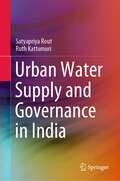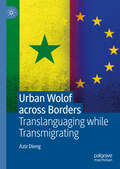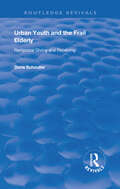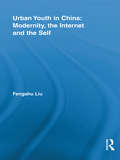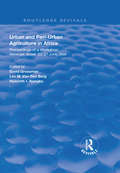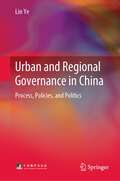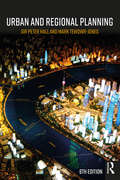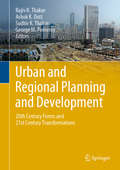- Table View
- List View
Urban Tourism in the Global South: South African Perspectives (GeoJournal Library)
by Christian M. Rogerson Jayne M. RogersonThis book examines and addresses the particular character of urban tourism occurring in the global South. It presents research essays on tourism in urban areas of South Africa, a country which is associated with big 5 nature tourism but where urban areas are also major tourism destinations. The book contextualizes urban tourism in South Africa as part of ‘the other half of urban tourism’, an overlooked but energetic scholarship which is emerging on urban places in the global South. The volume moves to present a collection of original material variously on national perspectives on urban tourism following by a cluster of city level perspectives. The last three contributions turn to the role of tourism in small towns, the bottom rung in the urban settlement system. Issues of concern include gastronomic tourism, VFR travel, airportscapes, climate change, AirBnb and creative tourism. Finally, as COVID-19 is potentially a defining historical moment for urban tourism, the volume incorporates historical research perspectives in order to address the overwhelming ‘present-mindedness’ of mainstream urban tourism writings. The book highlights the challenges and opportunities for tourism development in the environment of the urban global South and is relevant to scholars of both tourism and urban studies as well as researchers in development studies.
Urban Transformations
by Kerstin Krellenberg Florian Koch Sigrun Kabisch Erik Gawel Annegret Haase Sonja Knapp Jaime Nivala Andreas ZehnsdorfThe book addresses urban transformations towards sustainability in light of challenges of global urbanization processes and the consequences of global environmental change. The aim is to show that urban transformations only succeed if both innovative scientific solutions and practice-oriented governance approaches are developed. This assumption is addressed by providing theoretical insights and empirical evidence pointing particularly at 3 concepts or qualities which are determined here as being central for achieving urban sustainability: resource efficiency, quality of life and resilience. Urban case studies from several international research projects illustrate our conceptual approach of urban transformations towards sustainable development. Thus, the book reaches far beyond a mere additive description of single case studies. It incorporates the results of condensed synthesis, resulting from comparisons and evaluations. It provides, based on cross-cutting reflection of single cases and different scales and methods of analysis, general and transferable findings. They do not only consider the scientific sphere but deliberately go beyond it discussing transferability of knowledge into practice, governance options and the feasibility of policy strategies in order to pave the way for sustainable urban transformations to happen today and in the future.
Urban Transformations: Centres Peripheries And Systems
by Daniel O'DonoghueDefinitions of urban entities and urban typologies are changing constantly to reflect the growing physical extent of cities and their hinterlands. These include suburbs, sprawl, edge cities, gated communities, conurbations and networks of places and such transformations cause conflict between central and peripheral areas at a range of spatial scales. This book explores the role of cities, their influence and the transformations they have undertaken in the recent past. Ways in which cities regenerate, how plans change, how they are governed and how they react to the economic realities of the day are all explored. Concepts such as polycentricity are explored to highlight the fact that cities are part of wider regions and the study of urban geography in the future needs to be cognisant of changing relationships within and between cities. Bringing together studies from around the world at different scales, from small town to megacity, this volume captures a snapshot of some of the changes in city centres, suburbs, and the wider urban region. In doing so, it provides a deeper understanding of the evolving form and function of cities and their associated peripheral regions as well as their impact on modern twenty-first century landscapes.
Urban Transformations: From Liberalism to Corporatism in Greater Berlin, 1871–1933 (German and European Studies)
by Parker D. EverettUrban Transformations is a theoretical and empirical account of the changing nature of urbanization in Germany. Where city planners and municipal administrations had emphasized free markets, the rule of law, and trade in 1871, by the 1930s they favored a quite different integrative, corporate, and productivist vision. Urban Transformations explores the broad-based social transformation connected to these changes and the contemporaneous shifts in the cultural and social history of global capitalism. Dynamic features of modern capitalist life, such as rapid industrialization, working-class radicalism, dramatic population growth, poor quality housing, and regional administrative incoherence significantly influenced the Greater Berlin region. Examining materials on city planning, municipal administration, architecture, political economy, and jurisprudence, Urban Transformations recasts the history of German and European urbanization, as well as that of modernist architecture and city planning.
Urban Undergrounds: Contemporary Literary and Cultural Perspectives
by David Pike Rachel Falconer Jobst Welge Patricia García Madeleine Scherer C. Bruna Mancini Liesbeth François Anna Seidel Guillermo González Hernández Sophie U. Kriegel Irène Langlet Riikka P. Pulkkinen Loris RimazResearch in urban development in the social sciences has increasingly emphasized the importance of underground infrastructure for envisaging sustainable cities and for critiquing the economies of extraction. Urban Undergrounds: Contemporary Literary and Cultural Perspectives demonstrates the urgency of integrating a below-ground perspective into the emerging field of the Urban Humanities.The collection is divided into three thematic sections that cluster and revisit different sets of well-known motifs in Underground Studies: “Displaced”, “Buried” and “Wasted”. It showcases the intermedial nature of underground-focused analyses in literature, extending from literary texts to a wider range of cultural forms, including films, graphic novels and videogames. The contributors build on recent scholarship that has expanded the field into new interdisciplinary areas, including intersections with memory studies, ecocriticism and decolonial perspectives. Urban Undergrounds also explores lesser-studied subterranes, including those of Warsaw, Athens, Mexico City, Johannesburg and Santiago de Chile. The book’s substantial introduction offers a guiding theoretical and methodological framework for future scholars working with underground perspectives in literary and cultural studies.This thought-provoking and illuminating collection is a valuable resource for students and scholars in the areas of Literary Urban Studies, Underground Studies and Geocriticism, and more broadly in the Urban Humanities and Spatial Humanities.
Urban Uprisings
by Margit Mayer Catharina Thörn Håkan ThörnThis book analyses the waves of protests, from spontaneous uprisings to well-organized forms of collective action, which have shaken European cities over the last decade. It shows how analysing these protests in connection with the structural context of neoliberal urbanism and its crises is more productive than standard explanations. Processes of neoliberalisation have caused deeply segregated urban landscapes defined by deepening social inequality, rising unemployment, racism, securitization of urban spaces and welfare state withdrawal, particularly from poor peripheral areas, where tensions between marginalized youth and police often manifest in public spaces. Challenging a conventional distinction made in research on protest, the book integrates a structural analysis of processes of large scale urban transformation with analyses of the relationship between 'riots' and social movement action in nine countries: France, Greece, England, Germany, Spain, Poland, Denmark, Sweden and Turkey.
Urban Utopias: The Built and Social Architectures of Alternative Settlements
by Malcolm MilesUtopia tends to generate a bad press - regarded as impracticable, perhaps nostalgic, or contradictory when visions of a perfect world cannot accommodate the change that is necessary to a free and self-organizing society. But people from diverse backgrounds are currently building a new society within the old, balancing literal and metaphorical utopianism, and demonstrating plural possibilities for alternative futures and types of settlement. Thousands of such places exist around the world, including intentional communities, eco-villages, permaculture plots, religious and secular retreats, co-housing projects, self-build schemes, projects for low-impact housing, and activist squats in urban and rural sites. This experience suggests, however, that when planning and design are not integral to alternative social formations, the modern dream to engineer a new society cannot be realized. The book is structured in four parts. In part one, literary and theoretical utopias from the early modern period to the nineteenth-century are reconsidered. Part two investigates twentieth-century urban utopianism and contemporary alternative settlements focusing on social and environmental issues, activism and eco-village living. Part three looks to wider horizons in recent practices in the non-affluent world, and Part four reviews a range of cases from the author’s visits to specific sites. This is followed by a short conclusion in which a discussion of key issues is resumed. This book brings together insights from literary, theoretical and practical utopias, drawing out the characteristics of groups and places that are part of a new society. It links today’s utopian experiments to historical and literary utopias, and to theoretical problems in utopian thought.
Urban Village Redevelopment in Beijing, China: New Housing Opportunities for Migrant Workers
by Ran LiuThe book provides a multi-stage assessment of the changing housing opportunities of migrant workers in the three stages of Beijing’s urban village development (emergence, erasure and preservation). The volume re-theorizes Henry Lefebvre’s notion of the “right to the city” as a largely property-based concept that falls within the city’s hybrid tenure matrix of varying degrees of tenure security and formality that is undergoing entrepreneurialization or gentrification. This is another highly valuable contribution to China studies from the geographical perspective of the “territorial politics” at play in the process of urban village redevelopment, which has fostered a new propertied landowning class as winners, while moving low-wage migrants. The book takes the reader on a fascinating journey from peri-urban villages to IT worker villages to artists’ villages, revealing a restless landscape of urbanism and state-centered governance, as well as bottom-up counterplots. The fieldwork explores the contradictions of urban village redevelopment in Beijing. On the one hand, it is state-dominated and yet creates new housing opportunities for migrants; on the other, it disrupts old orders but also encourages new forms of grassroots alliances. The empirical studies of Beijing’s urban villages enrich Henry Lefebvre’s discourse on “planetary urbanisation,” Gilles Deleuze and Félix Guattari’s notion of the “rhizome,” and Elinor Ostrom’s ideas on the wise management of the “commons.”
Urban Village Renovation: The Stories of Yangcheng Village
by Peilin LiThis book addresses the mystery and diversity of urbanization in China, especially with regard to urban villages. The “village in the city” is a unique social phenomenon in the process of Chinese urbanization. A local village society composed of deep-rooted social networks linked by blood, geography, folk beliefs, and folk customs is the outcome of a complex social process, which is accompanied by changes in property rights, restructuring of social networks, and conflicting benefits and values. The end of the village is the epitome of social transformation, and for China as a whole, this change may take a very long time to complete. This book includes various examples of and stories on urban villages, offering readers a wealth of insights into the phenomenon and its significance.
Urban Villager: Life in an Indian Satellite Town
by Vandana VasudevanUrban Villager is a superbly etched and finely detailed representation of the life of an 'urban villager' in a modern satellite town of India. It describes how Delhi, as a city, is growing radially, stretching its way into the rural fringes of Haryana and Uttar Pradesh that border the city to form the National Capital Region. Through the microcosm of Greater Noida, a suburb of New Delhi, the author draws a portrait of life in a semi-urban town, where billion dollar homes and villages with no sewage system share the same pin code. Some farmers sell their land and try to cope with a new found prosperity; others refuse and break into agitations that make newspaper headlines. A builder destroys a wetland to make a township while the middle class in high rises frets about power and security. A few kilometres away, the Formula One event hosts international celebrities amidst bewildered villagers. Living here is being witness to the contradictions and ironies that occur when India is forced to co-exist with Bharat. The author frequently draws parallels with similar kinds of urbanisation on the outskirts of other Indian metros. Across the country, the city gobbles up more and more of what was once the countryside--whether it is Sriperumbudur in Chennai, Belapur in Mumbai, Yelahanka on the outskirts of Bengaluru or Rajarhat New Town in Kolkata. No matter where you live in India, the story of this book could be the story you see in your city.
Urban Villagers: Group and Class in the Life of Italian-Americans
by Herbert J. GansProviding a first-hand account of life in an inner city of contemporary sociology, this book is a systematic and sensitive analysis of working-class culture and of the politicians, planners, and other outside professionals who affected it. <p><p> This new edition is unique in that while the original text is intact, the author has added extensive postscripts to the final five chapters and the appendix. Additionally, he updates the study’s findings on American society, adding new material on poverty and inequality.
Urban Villages in the New China
by Da Wei David WangFocusing on Shenzhen as a representation of the general urban village phenomenon in China, this book considers the impact of China's economic reform on urbanization and urban villages over the past three decades. Shenzhen's urban villages are some of the first of their kind in China, unique in their diversity and organizational capacity, but most notably in their ability to protect village culture whilst coexisting with Shenzhen, one of the fastest urbanizing cities on earth. Providing a study of regional contrast of urban villages in China with newly collected fieldwork materials from Guangzhou, Beijing, and Xi'an, this book also considers recent developments within urban villages, including attempts at marketization of the so-called xiao chanquanfang (the quintessential urban village apartment units). It also addresses the corruption scandals that engulfed some urban villages in late 2013. Through cutting edge fieldwork, the author offers a cross-disciplinary study of the history, culture, socio-economic changes, and migration of the villages which arguably embody Chinese social mobility in an urban form.
Urban Visions: From Planning Culture to Landscape Urbanism
by Carmen Díez Medina Javier MonclúsThis book is a useful reference in the field of urbanism. It explains how the contemporary city and landscape have been shaped by certain twentieth century visions that have carried over into the twenty-first century. Aimed at both students and professionals, this collection of essays on diverse subjects and cases does not attempt to establish universal interpretations; it rather highlights some outstanding episodes that help us understand why the planning culture has given way to other forms of urbanism, from urban design to strategic urbanism or landscape urbanism. Compared with global interpretations of urbanism based on socioeconomic history or architectural historiography, Urban Visions. From Planning Culture to Landscape Urbanism, aims to present the discipline couched in international contemporary debate and adopt a historic and comparative perspective. The book’s contents pertain equally to other related disciplines, such as architecture, urban history, urban design, landscape architecture and geography.Foreword by Rafael Moneo.
Urban Vulnerability and Climate Change in Africa
by Paolo Gasparini Stephan Pauleit Adrien Coly Sandra Fohlmeister Gertrud Jørgensen Sigrun Kabisch Wilbard J. Kombe Sarah Lindley Ingo Simonis Kumelachew YeshitelaUrbanisation and climate change are among the major challenges for sustainable development in Africa. The overall aim of this book is to present innovative approaches to vulnerability analysis and for enhancing the resilience of African cities against climate change-induced risks. Locally adapted IPCC climate change scenarios, which also consider possible changes in urban population, have been developed. Innovative strategies to land use and spatial planning are proposed that seek synergies between the adaptation to climate change and the need to solve social problems. Furthermore, the book explores the role of governance in successfully coping with climate-induced risks in urban areas. The book is unique in that it combines: a top-down perspective of climate change modeling with a bottom-up perspective of vulnerability assessment; quantitative approaches from engineering sciences and qualitative approaches of the social sciences; a novel multi-risk modeling methodology; and strategic approaches to urban and green infrastructure planning with neighborhood perspectives of adaptation.
Urban Walls: Political and Cultural Meanings of Vertical Structures and Surfaces (Classical and Contemporary Social Theory)
by Andrea Mubi Brighenti Mattias KärrholmIn recent years, an increasing number of separation walls have been built around the world. Walls built in urban areas are particularly striking in that they have exacted a heavy toll in terms of human suffering. As territorialising devices, walls can be protective, but the protection they grant is never straightforward. This collection invites inquiry into the complexities of the social life of walls, observing urban spaces as veritable laboratories of wall-making – places where their consequences become most visible. A study of the relationship between walls and politics, the cultural meaning of walls and their visibility, whether as barriers or as legible – sometimes spectacular – surfaces, and their importance for social processes, Urban Walls shows how walls extend into media spaces, thus drawing a multidimensional geography of separation, connection, control and resistance. As such, the collection will appeal to scholars of sociology, anthropology, geography, architecture and politics with interests in urban studies and social theory.
Urban Warfare: Housing under the Empire of Finance
by Raquel RolnikHow finance and politics have caused the global housing crisisThe most comprehensive survey of the current crisis, Urban Warfare charts how the financial crisis and wider urban politics have left millions homeless and in financial desperation across the world.The financialisation of housing has become a global catastrophe, leaving millions desperate and homeless. Since the 2008 financial collapse, models of home ownership, originating in the US and UK, are being exported around the world. Using examples from across the globe, Rolnik shows how our cities have been sold to construction companies and banks, while supported by government-facilitated schemes, such as “the right to buy” subsidies and micro-financing. Our homes and neighbourhoods have become the “last subprime frontiers of capitalism,” organised by those who benefit the most.
Urban Wastelands: A Form of Urban Nature? (Cities and Nature)
by Francesca Di Pietro Amélie RobertFaced with the growing demand for nature in cities, informal greenspaces are gaining the interest of various stakeholders - residents, associations, public authorities - as well as scientists. This book provides a cross-sectorial overview of the advantages and disadvantages of urban wastelands in meeting this social demand of urban nature, spanning from the social sciences and urban planning to ecology and soil sciences. It shows the potential of urban wastelands with respect to city dwellers’ well-being, environmental education, urban biodiversity and urban green networks as well as concerns regarding urban wastelands’ in relation to conflicts, and urban marketing. The authors provide a global insight through case studies in nine countries, mainly located in Europe, Asia and America, thus offering a broad perspective.
Urban Water Supply and Governance in India
by Ruth Kattumuri Satyapriya RoutThis book investigates institutional dimensions of urban water supply in India, with a specific focus on institutional capabilities to provide drinking water to urban households in an efficient, equitable and sustainable manner. This book has been developed through empirical research within the context of growing urbanisation and increasing water needs of Indian cities, and the wider developmental goal of achieving universal and equitable access to safe and affordable water for all – as envisaged in goal 6 of the SDGs.This study revolves around three important aspects of urban water supply and governance. Firstly, it attempts to understand household water service delivery scenarios in urban India, drawing from case studies based on our household survey in four cities – Ahmedabad, Bangalore, Kochi and Hyderabad. Secondly, it examines the question of existing socio-economic inequality and access to water in an urban context in India. While dealing with the issue of inequality and access to water, it attempts to explore the question of whether access to water and water scarcity is socially neutral; whilst also analysing the mechanisms employed by the urban poor to manage their daily water needs. Thirdly, this book explores the role of institutions for efficient and effective delivery of water in urban India. The institutional analysis from a comparative perspective provides important insights to guide current reforms in domestic water supply in India, especially in a neo-liberal context. The book is a valuable resource for academicians, policy makers and practitioners involved in water governance in general and domestic (drinking) water supply in particular. Besides, it is of great interest to those working in the area of urban development, urban planning and household water management. The book is an outcome of a collaborative research project by the authors sponsored jointly by University Grants Commission (UGC), New Delhi and UK-India Education and Research Initiative (UKIERI).
Urban Wolof across Borders: Translanguaging while Transmigrating
by Aziz DiengThis book takes urban Wolof beyond Senegal to consider the effects of mobility on language and examine how the diasporans engage in their daily language practices as transmigrants. The parallel between languaging and migrating underpins the author's argument, as he examines the dynamicity of languaging at both micro and macro levels, as speakers navigate across spaces and languages. Moving away from a code-based approach, the author makes a compelling case that the urbanite, rather than shuttling between codes, deploys instead idiolectal features from a unique linguistic repertoire which comprises at once semiotic, cognitive, and language features. His indigenous approach affords novel perspectives in linguistic ethnography and complements the Euro-Western methodologies.
Urban Youth and the Frail Elderly: Reciprocal Giving and Receiving
by Doris SchindlerThere are two groups of urban residents who, although quite unlike each other, can complement each others' needs. They are the frail elderly and low-income teenagers. This study is about Project MAIN: The frail elderly need help with grocery shopping, and low-income teenagers need an income-generating jobs program so that they may earn some money. The matching of needs in Project Main was an attempt to coordinate disparate community demographics in a mutually beneficial way
Urban Youth in China: Modernity, The Internet And The Self (Routledge Research in Information Technology and Society)
by Fengshu LiuFengshu Liu situates the lives of Chinese youth and the growth of the Internet against the backdrop of rapid and profound social transformation in China. In 2008, the total of Internet users in China had reached 253 million (in comparison with 22.5 million in 2001). Yet, despite rapid growth, the Internet in China is so far a predominantly urban-youth phenomenon, with young people under thirty (especially those under twenty-four), mostly members of the only-child generation, as the main group of the netizens’ population. As both youth and the Internet hold the potential to inflict, or at least contribute to, far-reaching economic, social, cultural, and political changes, this book fulfills a pressing need for a systematical investigation of how youth and the Internet are interacting with each other in a Chinese context. In so doing, Liu sheds light on what it means to be a Chinese today, how ‘Chineseness’ may be (re)constructed in the Internet Age, and what the implications of the emerging form of identity are for contemporary and future Chinese societies as well as the world.
Urban and Peri-urban Agriculture in Africa: Proceedings of a Workshop, Netanya, Israel, 23-27 June 1996 (Routledge Revivals)
by David Grossman Leo M. van den Berg Hyacinth I. AjaegbuPublished in 1999, this work sets out to assess the potential of urban and peri-urban agriculture for generating income and for improving food supply for the growing urban population in Africa. It considers both full-time small-holder farmers and part-timers, who hold land under various tenurial conditions. Since the book is a collection of papers based on field studies, it contains a wide range of approaches, methods of investigation, and scientific findings.
Urban and Regional Governance in China: Process, Policies, and Politics
by Lin YeThis book examines the process, policies, and politics of urban development in China, with particular attention to city region governance, urban redevelopment, and urban–rural interaction through intensive theoretical discussions and extensive case studies. It offers ample data, pictures, and illustrations to provide readers with a deep understanding of urban policies and policies in China. The regional and metropolitan perspective is emphasized to analyze the urban–rural transition and how it affects urban governance. This book develops a well-grounded political economy analysis to examine how city region development and governance evolve in China. Such development is the focal point of China’s continuing urbanization, and its impact needs to be carefully analyzed. In the end, this book aims to foster discussions that may lead to serious consideration on China’s future urbanization route.
Urban and Regional Planning
by Peter Hall Mark Tewdwr-JonesThis is the sixth edition of the classic text for students of urban and regional planning. It gives a historical overview of the developments and changes in the theory and practice of planning throughout the entire 20th and first part of the 21st centuries. The extensively revised edition incorporates the most important developments in recent times: debates on economic rebalancing and national infrastructure including high speed rail, energy, millennium projects, Celtic devolution, European influence, impact of London on nation. A new chapter "Planning for cities and city regions 1990-2017": includes new material on housing, localism, neighbourhood planning, privatisation, city modernism, reform, Devo and city deals and metro mayors. Urban and Regional Planning will be invaluable to undergraduate as well as postgraduate Planning students. It will prove useful in a variety of built environment areas such as Architecture, Landscape Architecture, Urban Design, Real Estate where planning is taught.
Urban and Regional Planning and Development: 20th Century Forms and 21st Century Transformations
by Ashok K. Dutt Rajiv R. Thakur Sudhir K. Thakur George M. PomeroyThis book discusses urban planning and regional development practices in the twentieth century, and ways in which they are currently being transformed. It addresses questions such as: What are the factors affecting planning dynamics at local, regional, national and global scales? With the push to adopt a market paradigm in land development and infrastructure, the relationship between resource management, sustainable development and the role of governance has been transformed. Centralized planning is giving way to privatization, not only in the traditional regions but also in newly emerging regions of Asia, Africa and Latin America. Further, attempts are being made to bring planning related decision-making closer to the people who are most affected by it. Presenting a collection of studies from scholars around the world and highlighting recent advances in the field, the book is a valuable reference guide for those engaged in urban transformations, whether as graduate students, researchers, practitioners or policymakers.
